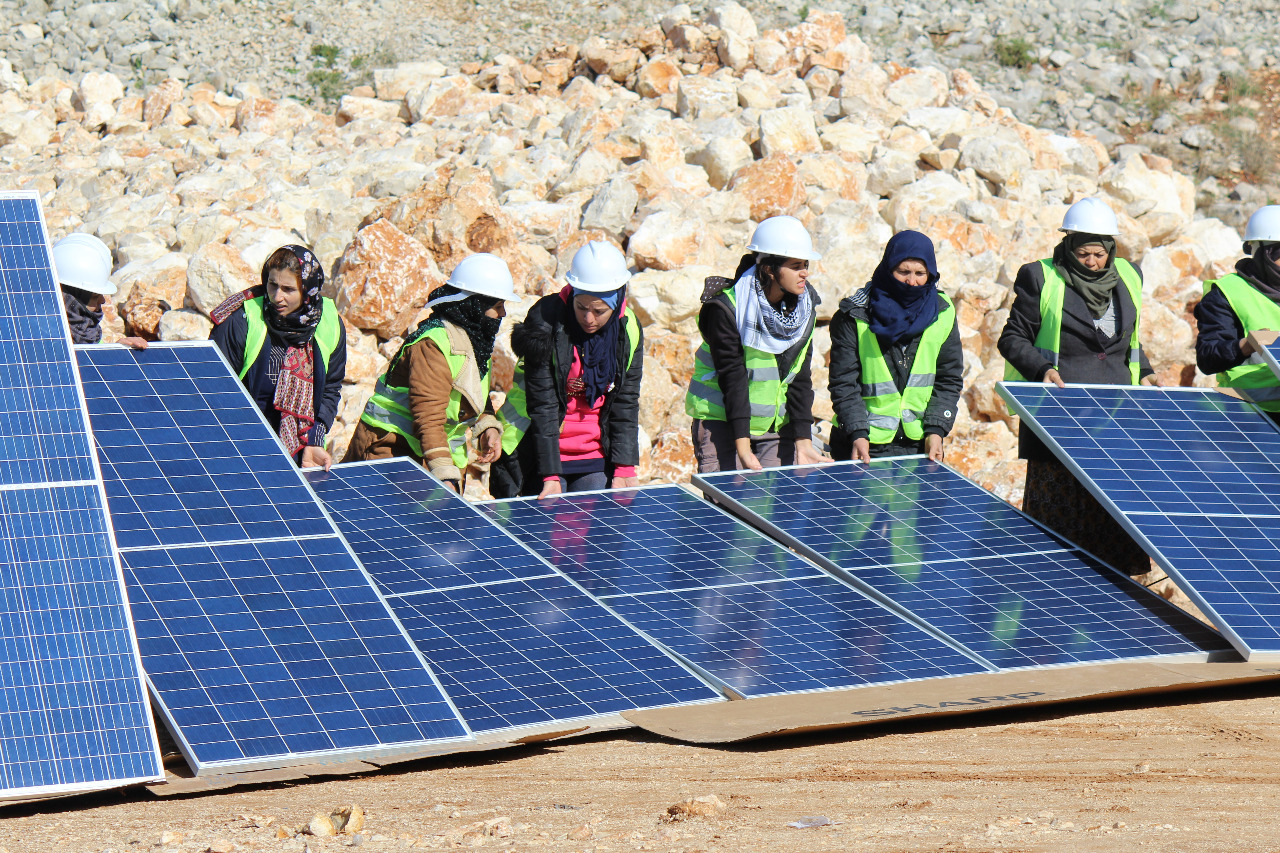RISE 2030: Women for results
The first all-women solar team in Lebanon challenges the gender stereotypes in the male-dominated construction sector

RISE2030 is a community-led initiative that focuses on empowering women and youth, by capacity building and improving living conditions through access to education and employment. RISE2030 launched the first all-women solar team in Lebanon to challenge the gender stereotypes in the male-dominated construction sector. The project was implemented in The Federation of Bouhayra Municipalities, which serves more than 18 municipalities around the Qaraoun Lake.
RISE2030 project is managed by Sustain The World in Lebanon and Sustainable Empowerment for Youth International in the USA.
The water-food-energy nexus
RISE2030 community members were trained and educated to design and install an on-grid solar photovoltaic system that would cover 100 percent of the waste sorting facility's daily power needs, and later a second team installed a solar tree in the public garden. In 2021, RISE2030’s teams installed systems for the Waste recycling facility in Jeb Jannine and the Waste Water Treatment plant in Aitanit.
In addition, the management team leading this project is composed of mostly women, with a total of 600 women involved and benefiting from the activity.
The project also helped female-led small businesses prepare and sell their rural processed food through the women's association of the town.
The project was hailed as a national success, given the launch of the first all-women team in solar energy in Lebanon.
Key facts
- RISE2030 launched the first all-women solar team in Lebanon in the construction sector, where less than 1 percent are women in the general workforce.
- 600 women are involved and directly benefiting from the activity in Bekaa, executed with German government funding and implemented by Gesellschaft für Internationale Zusammenarbeit (GIZ), Sustainable Empowerment For Youth (SEFY) and Sustain The World.
- 80 women were trained in North and Mount Lebanon with Rene Mouawad Foundation (RMF) under the Women Economic Empowerment Project and with the American University of Beirut - Environment and Sustainable Development Unit (AUB ESDU) in the South and Bekaa. The project is funded by The Canadian Embassy and implemented by UNDP.
- All of the activity’s beneficiaries are underserved youth, women, and refugees in a disadvantaged region – 8 percent were disabled, and 42 percent were refugees.
The challenge
Lebanon is a highly urbanised country with most of its population in coastline cities that are vulnerable to climate-related sea-level rise. A predicted reduction in rainfall and increased temperatures are likely to result in a decrease in snow, a vital water source, which will negatively impact on Lebanon’s water supply, particularly during seasonal high water demand for irrigation.
Compounding these issues, Lebanon faced a financial and economic collapse in October 2021, the COVID-19 crisis in February 2020, and a massive explosion in Beirut in August 2020.
The multidimensional poverty rate in Lebanon doubled from 42 per cent in 2019 to 82 per cent of the total population in 2021.
The solution
RISE2030 empowers women and youth while contributing to Lebanon’s energy transition by providing sustainable education on renewable energy and employment in disadvantaged regions of Lebanon. RISE2030 builds on the Sustainable Development Goals (SDGs) set in 2015 by the United Nations General Assembly and is intended to be achieved by 2030. Working on 13 out of the 17 SDGs, RISE2030 aims at promoting and achieving justice, equality, sustainability, and peace.
Helping the planet
RISE2030 implemented a community installation activity at the waste sorting and material recovery facility in Qaraoun, serving Al Bohaira Federation of Municipalities. The facility receives municipal solid waste from six municipalities and performs a range of activities to recover material and achieve higher recycling rates. This includes waste sorting, baling, storing, and moving.
RISE2030 community members were trained and educated to design and install an on-grid solar photovoltaic system that would cover 100 percent of the facility's daily need for power. Qaroun Material Recovery Facility is a model for sustainable facilities, reducing waste volume, promoting circular economy, and running on solar. This is powered by a community of newly-skilled labour of young women and men, ready to hit the solar market.
RISE2030 community members also worked on waste recycling facilities, wastewater treatment plants, and solar trees.
Helping people
RISE2030 is built on three major pillars: empowerment, equality, and sustainability. To support equality. In addition to launching the first all-women solar team to challenge the gender stereotypes in the male-dominated construction sector and launching solar training in rural areas where women have much lower access to basic human rights.
The project also helped female-led small businesses and women in the cooperatives prepare and sell their rural food through the town’s women’s association. The management team leading this project is also mostly women.
RISE2030 assisted female farmers during the COVID-19 crisis and lockdown to help ensure organic production and food distribution to underserved areas in coordination with the Women Association of Social Development (WASD) given the financial and economic crisis prior to the COVID-19 pandemic. The situation was exacerbated by the lockdown, which left more than half the population without access to employment, food, healthcare and basic necessities.
RISE2030 later further initiated a direct response to the Beirut Explosion by assisting teams on the ground in the reconstruction and recycling to ensure a sustainable rebuilding of the capital.
Spillover effect
The activity is being replicated in many areas, municipalities and regions on a national level. RISE2030 is also looking to expand the model to a global level.
Green Circles is a sustainable, eco-innovative, and circular initiative launched in 2022. The project adopts a circular green approach that simultaneously tackles the climate, waste, energy, and economic crises all the while reducing gender inequality and empowering women, youth, refugees, and underserved community members.
Find out more:
Facebook: https://www.facebook.com/rise2030/
Twitter: https://twitter.com/Rise_2030
Instagram: https://www.instagram.com/rise.2030/
LinkedIn: https://www.linkedin.com/company/rise2030/
Website: https://www.rise2030.com/
Implementing Partners: